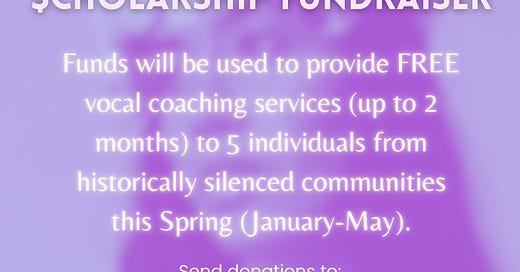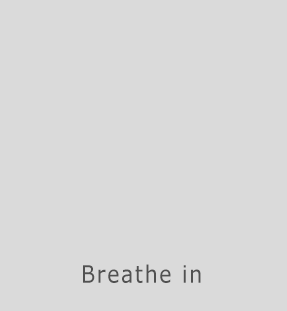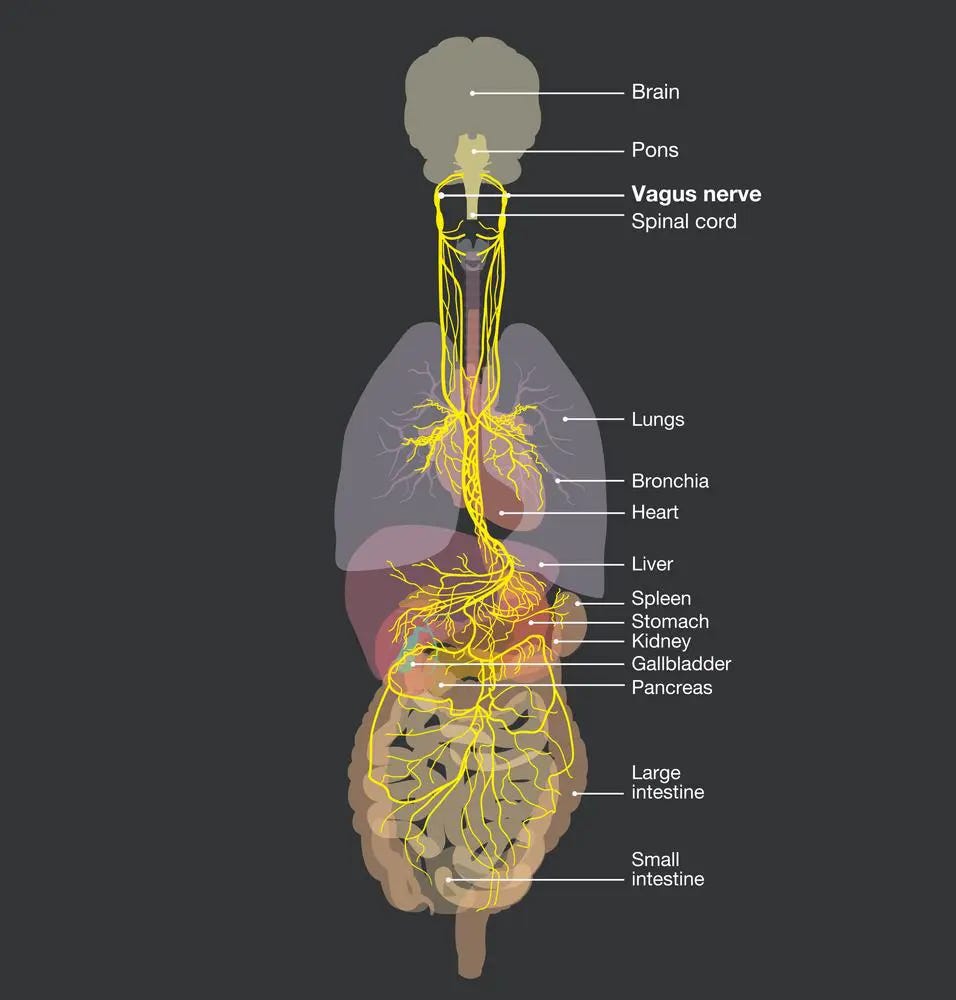How singing will liberate us all...
Support the $cholarship Fund and receive FREE tarot reading.
For some of us, it may seem like a stretch to consider how singing can support our collective liberation because, well, singing is generally seen as frivolous and unnecessary for survival.
But, is it?
In almost every culture all over the world, singing is incorporated in traditional rituals and community gatherings because our ancestors understood the incredible effects of singing on the body and how singing can connect us to one another, as well as the spiritual realms, through raising our body’s vibration, or frequency.
While completing my sound healing certification, I learned that every organ in our body resonates at a certain frequency, and so sound has been used in cultures all over the world to help rebalance, attune, and heal the body to its original frequency.
For example, in the first few months of caring for my newborn baby, I was experiencing terrible pains in my wrists and thumbs whenever I would pick up my baby. The pain was worse than childbirth. So after months of dealing with this pain, I finally went to the doctor, who told me this is a common experience for new mothers, and basically, it was tendonitis. So what did they do to heal the tendons?
Ultrasound therapy.
They used a wand with tiny crystals in the end of it that emitted frequencies undetectable to the human ear and rubbed it on my wrists for 8 minutes per wrist. Now, my wrists are back to “normal” and I haven’t experienced pain in months.
As a singer, I would like to invite you in on three lesser known facts about singing and why I think it is central to our collective liberation…
1. Singing releases “feel good” chemicals
Endorphins, serotonin, oxytocin, and dopamine are mood boosting chemicals that are associated with feeling good and are released while singing. Singing is an accessible form of natural pain relief and mental health support. This is why, for me, singing and childbirth go hand in hand.
2. Singing is an aerobic activity and supports lung function
Many websites define aerobics as—any form of physical exercise that engages large muscle groups and is rhythmic and repetitive. If you have ever spent time in a choir or sang karaoke for long periods of time, you might have experienced how tiring singing can be. Because singing is mostly connected to our respiratory system, we use all the muscles that are connected to our breath, including our abdominals, pelvic floor, and gluteus maximus. This focus on the breath in singing also introduces more oxygen into the bloodstream, which is necessary for bone, skin, and muscle regeneration, and helps increase lung capacity.
3. Singing tones your vagus nerve and promotes holistic health
The vagus nerve is part of the parasympathetic nervous system and connects to several organ systems. When it’s stimulated the vagus nerve puts our bodies into “rest and digest” mode, or in other words, into a felt sense of safety. Singing stimulates the vagus nerve, along with humming or chanting, through muscles in the back of the throat. Over time, this creates more vagal tone, allowing the body to not only access this sense of safety, but access it more quickly after being activated. This ability to access a sense of safety in one’s body is a baseline need for every human being.
Read more: “Choir Singing Improves Health, Happiness” by University of Oxford
Healthy Individuals = Healthy Community = Healthy Collective
Throughout my life, I have been lucky to remain close to singing communities in my education and career aspirations, but whenever I venture just a little bit outside of those communities, I have noticed a major difference in individuals who sing and who do not, regardless of talent or ability. In many folks who do not have a regular singing practice, I can sense lower self-esteem, a very critical inner voice, and a lack of connection to their emotional bodies/expression. In essence, it’s a form of being silenced and dehumanized.
And I believe, this is exactly what colonialism wants to have happen to the collective.
Before there was recorded music, families and communities sang together all the time, whether it was for spiritual and religious reasons or for entertainment. But now, there are iPhones, computers, radios, tablets, and other devices that play music for us, which has caused us to disconnect from the sound of our voice.
Since beginning my decolonization journey, my ancestors have led me to look towards indigenous traditions of ritualistic singing and dancing. They have shown me how the Western world has outsourced singing to celebrities and those within the entertainment industry, causing us to forget the need for singing in our daily lives.
So when I share about my offerings, I am not just talking about learning a new skill or placing a bandaid on our mental health. I am sharing my vision for how singing will liberate us all by starting with reconnecting to our individual voices and bodies, so that we can re-member our own humanity, feel good in our bodies, support our holistic health, and resource ourselves to fully awaken to the realities of our world. Collectively, we are hurting, in pain, and suffering from the effects of late stage capitalism and colonialism, and most recently, we have been forced to open our eyes to the genocide of the Palestinian people.
We have been called to rise up, birth a new world, and sing a new song.
Are you ready to join the Singing Revolution 2.0?
Become a paid subscriber and receive 24/7 access The Voice Doula Den where there are self-paced voice/music classes, meditations, sound baths, and tarot readings available to support you along your vocal liberation journey!
Give the gift of healing for the holidays by purchasing a “Buy One, Gift One” Session!
Subscribe + Like SOFT POWER TV on YouTube 💜
Support The Voice Doula by donating to the $cholarship Fund that will provide FREE vocal coaching sessions to folks from historically silenced communities this Spring.

xoxo,
This article is based on Opera Norths article “10 Reasons Singing Is Good For You”










